Puppy feeding plays a pivotal role in a dog’s physical and mental development journey. A cute and furry little pup attracts the eye and feeling “Aww” is very natural.
But the secret of a puppy being all cute, furry, and healthy lies in puppy food and appropriate puppy feeding. Here, we bring you a puppy feeding guide that will take care of your new puppy and make his journey to adulting a healthy one.
Whether you are a first-time dog owner or an experienced one, you are bound to make some mistakes. In this article, we will make sure that puppy feeding mistakes do not happen.
So, go ahead and scroll through our ultimate puppy feeding guide and understand the importance of feeding a puppy right.
Table of Contents
Why A Puppy Feeding Guide Is Essential?
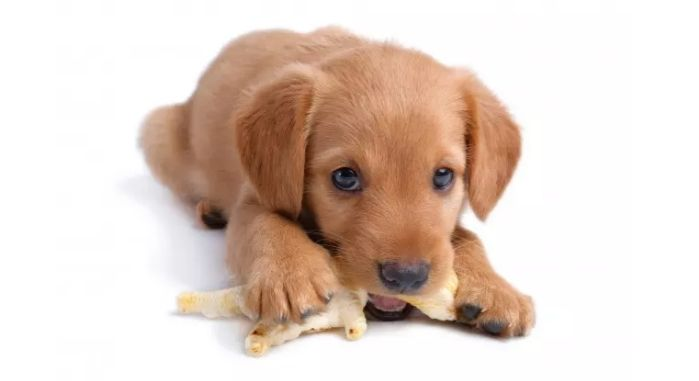
A puppy feeding guide is essential for mainly novice dog owners. First-time dog owners can make a lot of mistakes concerning a puppy’s food. Often, many dog owners don’t know that puppy food is different from adult dog food.
This simple mistake and lack of knowledge can disrupt a puppy’s development. Yet, even with a poorly managed puppy feeding schedule and diet, your pup manages to grow and develop into a well-built adult dog.
The problem only starts up showing as your puppy has gone past his adulting and entered senior age. Some puppies make it good throughout their life without early or newborn puppy feeding precautions. But many are prone to poorly developed bones and digestive system because of no knowledge of feeding a puppy.
Some mistakes can be made by experienced dog owners as well. But as some dogs manage to live a healthy life without proper feeding during their early ages, experienced owners never notice any problem.
Difference Between Puppy Food and Adult Dog Food
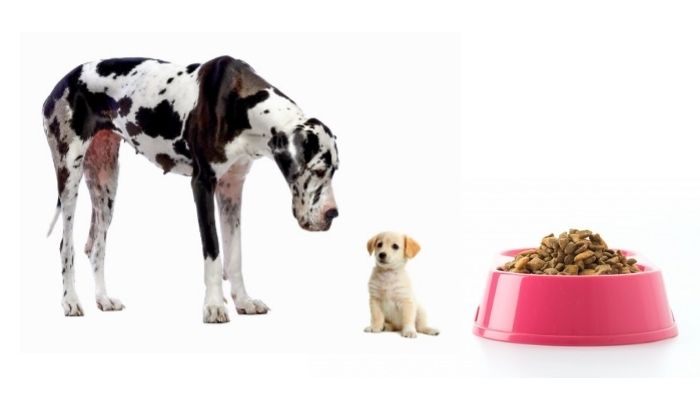
Before jumping right on to a puppy feeding guide dog parents should first understand the difference between puppy food and adult dog food. Many dog owners are completely unaware of the fact that adult dog food and puppy food are absolutely different. Puppies have different and additional nutritional needs than adult dogs.
A puppy and an adult dog are just considered as developing phases of one animal but these phases can make a dog like two different animals. As a responsible dog parent, you have to differentiate between adult dog food and puppy food.
The difference in food starts from a puppy’s expansive need for nutrition than an adult dog. A puppy also has higher energy levels than an adult dog. To maintain their energy, they require more food and more calories.
Calories, protein, fats are all of utmost importance in a puppy’s development. The calorie intake also helps puppies in growing bone strength. This is where all the difference in puppy and adult dog food lies. The number or percentage of nutrients in both the foods is different and thus adult dog food is not suitable for puppies.
Dog food for adult dogs and puppies has different nutrient quantities depending upon their body requirements. Below is a percent wise breakup of nutrients in both puppy and adult dog food:
| Nutrient | Puppy Food | Adult Dog Food |
| Protein | 22% | 18% |
| Fat | 8% | 5% |
| Calcium | 1% | 0.6% |
| Phosphorus | 0.8% | 0.5% |
| Sodium | 0.3% | 0.06% |
What Food Should Puppies Eat?
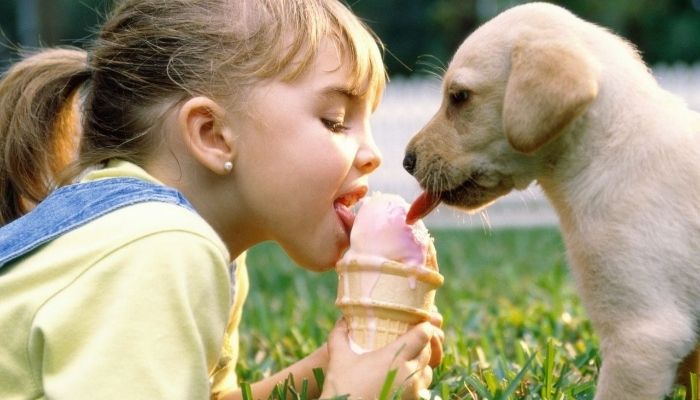
Now that you know the difference between adult dog food and puppy food let’s move ahead to foods your puppy should be eating.
For the first 6 to 8 weeks of a newborn puppy, their mother’s milk is the most important food and form of nutrition for them. Puppies at this early age should not be deprived of access to their mother’s milk. It is very important for a puppy’s early development and boosts their further development as well.
1. Solid Food
In their early days, puppies only consume mother’s milk and slowly they can be allowed to eat solid food. Switching your pup from just milk to solid food should be done over the time of 2 to 3 weeks. Choose a puppy food of any brand but choose high-quality puppy food.
Puppies can consume solid food at 4 to 6 weeks. You can proportionately mix the solid food with their milk or milk replacer. This is how they should be introduced to solid foods.
2. Puppy Food
The only type of food your puppy should be eating is a premium quality puppy food. This food is packed with high proteins, rich minerals, vitamins, and fats that boost their body growth and strengthen their bones and muscles.
Puppy food can also include puppy kibble, dry food, and wet food or semi-moist food. The growth rate of puppies is ten times faster than adult dogs and they may need all the above-mentioned types of food but in smaller portions.
3. Dry Puppy Food and Wet Puppy Food
Growing beyond 11 months and after 1 year of age, your puppy will require solid foods a lot. Deciding between dry puppy food and wet puppy food is another important puppy feeding decision.
Wet food once opened has all the potential to go stale and inedible. However, with dry food that is not the case. Some puppies love dry and crunchy food as their teeth are developing and make them like chewy, crunchy stuff more.
Other puppies on the other hand might like their food wet or semi-moist. If wet puppy food goes bad too quickly you can moisten your pup’s dry food with water or little milk and feed them. Puppy feeding should be cautiously observed like feeding human babies.
4. Homemade Puppy Food
Puppy feeding is not necessarily the same for all puppies some puppies love packaged food while some love homemade food and the rest love both. You can also serve them homemade food or sometimes human food as well.
You can feed them homemade boiled chicken and meat, fish, turkey, or lean beef. Veggies like beans, peas, carrots. Rice, pasta, potatoes can also be included in their homemade diet.
You can also feed them fruits like Oranges, Watermelon, Cantaloupe, or Guava.
Puppy Feeding Guide: One Year Framework
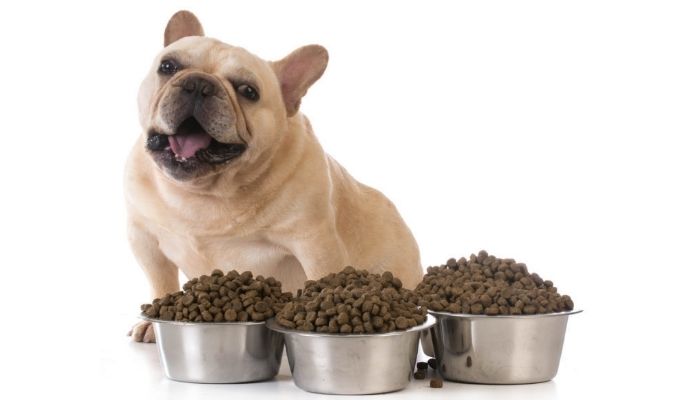
1. 6 – 12 Weeks
When a puppy is at its growing stage, the major aspect of feeding boils down to ‘nutrition’.
Appropriate nutrition is what will ignite healthy growth and hence, they should be fed with puppy food.
Feeding them adult food will keep them away from the required nutrition and hinder the appropriate growth required for the puppy to mature.
Feed them 3 to 4 times during a day.
Larger breeds are recommended to be fed dry food when they’re 9 – 10 weeks of age and smaller breeds should be fed at around 12 – 13 weeks of age.
2. 4 to 5 Months
During this age mostly, the puppies begin to mature and lose their potbelly and pudginess.
But if, after 12 weeks the changes are unnoticeable you can continue feeding them puppy food until the changes are visible.
Puppy feeding at this age should be mainly of puppy food 3 times per day.
It’s better to be on the side of puppy food quite longer than to regret later about not staying long enough.
3. 6 to 8 Months
Before 6 – 8 months of age, you can switch from puppy food to adult maintenance food.
Smaller breeds are recommended the switch after 7 – 9 months, whereas larger breeds can make the switch after 12 – 13 or even 14 months of age.
2 meals a day is a sufficient frequency to maintain good health.
4. 9 to 11 months
At 9 to 11 months of age, your puppy is almost a dog now and this time is ideal to set a puppy feeding schedule that can be followed throughout their adult ages.
Start with 2 meals a day. At this point, you should fix a time and place for your puppy to eat its meal.
5. After 1 Year
After 1 year of age, all dogs are suggested to be fed food consisting of adult dog maintenance properties irrespective of their breeds or sizes.
The frequency of feeding the food depends on the activity level and the ongoing training of the dog.
Even though, after a year they shouldn’t be fed more than 2 – 3 times a day.
After 1 year a puppy starts growing into an adult dog and then you should start mixing their food. Make sure their diet now consists of 25% puppy food and 75% adult dog food.
Suggested: Human Foods For Dogs
How Much Food a Puppy Should Eat?
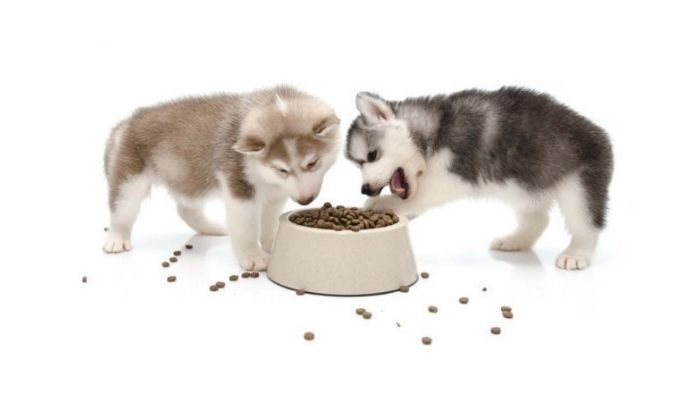
Now that you know what food and when puppies should eat that food, let us know how much food a puppy should eat? A puppy feeding guide shall remain incomplete without knowing the portion size of food servings.
Puppy feeding should be divided into 2 to 3 servings of 1 or ¼ cup of food each day. All servings should be divided into 2 to 3 servings.
When feeding a puppy, you should always consider their weight at maturity and the food quantity should be decided accordingly.
- 3 to 12 pounds – When your puppy will weigh approximately 3 to 12 pounds and should be fed ½ to 1 cup of food each day.
- 13 to 20 pounds – Puppy feeding for a 4 to 5 months old puppy weighing 13 to 20 pounds should be 2/3 or 1-1/3 cups of food each day.
- 21 to 50 pounds – At 6 to 8 months feed your puppy 1/8 to 2/3 cups of food per day.
A puppy’s weight can also vary and increase according to their breed size. Different sized puppies can have different feeding requirements. Below is a breed size distribution and puppy feeding guide for the different sized breed.
Puppy Feeding Guide for Small Breed Puppies
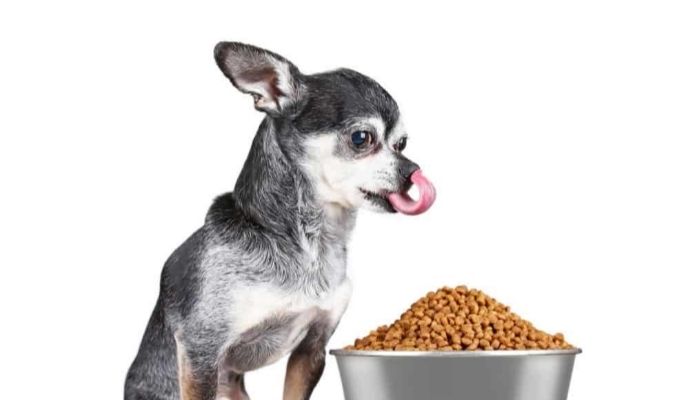
Small breeds like the Chihuahua or the Yorkshire terrier are small breeds and require about 2 years to fully mature. It won’t be wrong to call them puppies until they are 2 years old.
Small breed puppies have different feeding and nutritional requirements than medium-sized and large breed puppies. Small breed puppies should be fed 4 meals of 1 or ¼ cup portion size every day around or after 3 to 4 months of age.
Here are some of the best small breed puppy food options you can select from.
Puppy Feeding Guide for Medium-Sized Breed Puppies
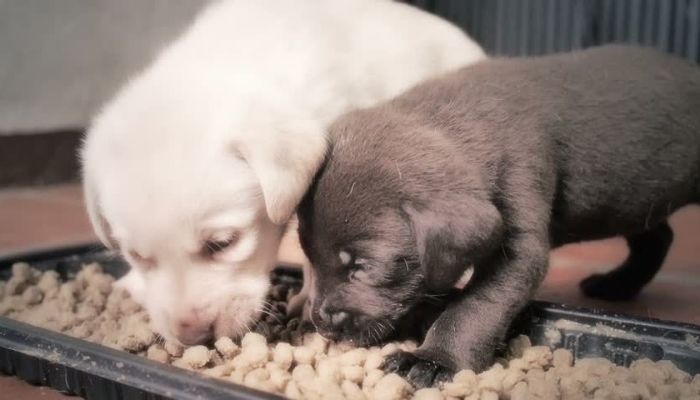
Medium-sized breeds are just the perfect sized dogs and puppy feeding for medium-sized breed puppies is easier than the other sizes.
Until 4 months of age, these puppies should be served 3 to 4 meals a day. A medium-sized breed’s puppy feeding should be according to its weight.
When your puppy is 5 to 10 pounds feed him ½ to 5/8 cups or ¾ to 1 cup every day.
At 20 pounds feed them 1- ¼ cup or 1 – ¾ cup of food.
At 40 pounds serve them 2 to 3 meals of 2- ¼ cup or 3 cups a day.
Puppy Feeding Guide for Large Breed Puppies
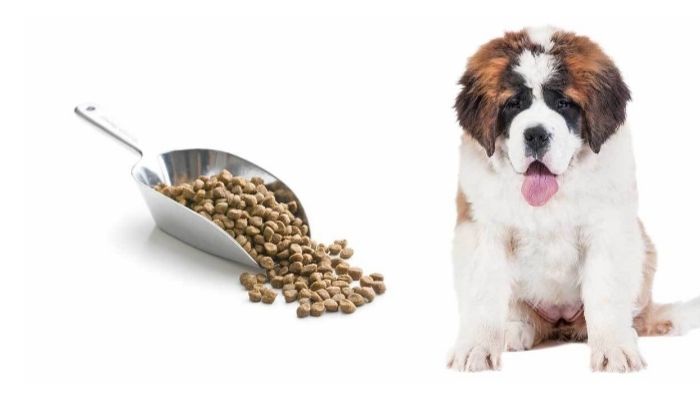
All puppies are not the same and especially not the large or giant breed puppies. Large breed puppies are going to grow big over time and their nutritional needs as a puppy are different from the others.
Large breed pups need foods that provide high energy and are filled with high proteins, fats, and most importantly calories. Giant breed puppies like Saint Bernard require more calories and proteins.
Regular puppy food has lower calories than large breed puppy foods and special and exclusively large breed foods should only be given to these puppies.
Ideal puppy feeding for large breed puppies should be according to their weight as well. Check their weight every 2 months and accordingly increase or decrease their meal portion size.
at 8 to 12 weeks give them 3 to 4 meals of 1 to 3 cups every day. After 12 weeks you can divide it into just 2 meals of 1- ¼ cup or 2/3 cup food.
You should also choose an appropriate large breed puppy formula. This gives their nutritional needs and growth rate the right direction.
Puppy Feeding Schedule
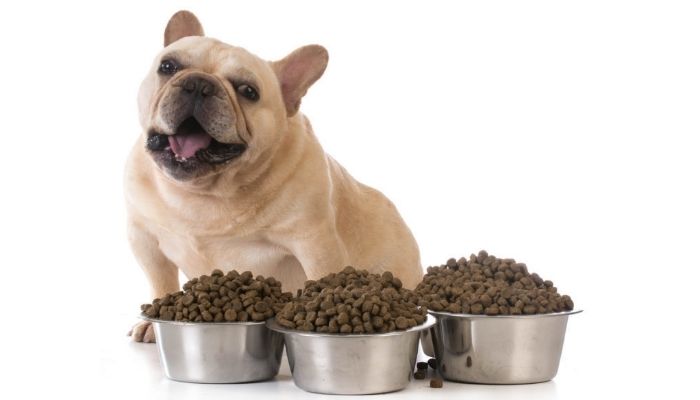
Our puppy feeding guide so far must have helped you understand what and how much food a puppy should eat. But knowing exactly when to feed your puppy is also important.
We advise all dog parents to make a puppy feeding schedule and stick to it so that your pup stays healthy forever. Know what and how is not enough for correct puppy feeding having a schedule for puppy feeding is also important.
A puppy feeding schedule will help you make sure that your puppy eats right and eats it at the right time.
- Make a meal schedule for your pup that provides them 3 meals (measured) every day and at the same time.
- A puppy should have his/her first meal early in the morning around 7 a.m.
- The next meal that is the second meal of the day should be at noontime that is 12 p.m.
- The third and last meal of the day should be their dinner and served them by 5 p.m. everyday.
- Their last meal or their dinner time should always be fixed and there should be a long duration in before their first meal of the next day.
- The longer duration allows the puppies to digest the previously eaten food as they have tiny bellies.
- This puppy feeding schedule should be followed strictly until your little pup turns 14-18 weeks old.
- Once your puppy has reached 18 weeks you should reduce the 3 meals to 2 meals every day.
- Refrain from using cheap and low-quality puppy food, cheap quality food can be cost saving today but it can affect your pooch’s health later.
- Select premium quality food and also make your tiny friend exercise. An ideal puppy feeding schedule should not be only about food and feeding time.
- Before serving your puppy the 7 a.m. meal take make him/her do a quick exercise.
- After the first meal let them take some rest and take them outdoors for playing or just a walk.
- 2 hours before lunch let them have some playtime and a good nap.
- After their noontime meal take your puppy for a small walk again. A little exercise before and after each meal helps puppies in digesting the food properly.
- Repeat the same before and after their evening meal or dinner.
If dog parents follow this puppy feeding schedule for their buddies from a very early age, it helps in building a good digestive system for the dog.
Puppy Feeding Tips
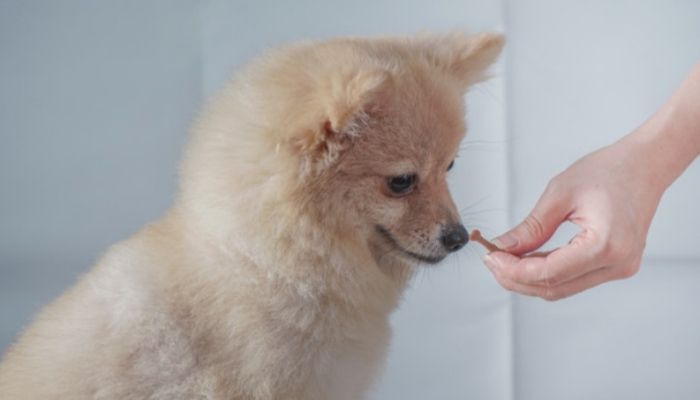
When you decide to bring a dog home you bring in responsibility. Almost everyone wishes to bring home a dog when he/she is just a puppy. Taking care of a puppy largely consist of taking care of the puppy feeding and schedules.
So far, we have told what foods can a puppy eat, when they should eat and how much food a puppy should eat. After knowing all this sticking to a puppy feeding schedule is also essential.
However, there are other things to puppy feeding as well, here are some puppy feeding tips:
- Once you have picked a good premium quality puppy food you should also pick an easily accessible food and water bowl.
- Also, pick a good spot in your house where your puppy can go and eat in peace without being distracted by other activities. Deciding a spot with a floor that is easy to clean is also of great help for humans.
- Make a good judgement based on your pup’s breed size and provide them 3 meals every day until they are 6 months old. As they grow reduce it 2 meals a day.
- Always limit and measure your puppy’s food intake as they can catch a habit of overeating and later grow into an obese adult dog.
- Do not keep their food available in the bowl once the puppy has eaten. Keep the food available in the eating spot up to 30 minutes only.
- Puppies sure love to chew stuff and having something to eat is always a good idea for them. Do not let you puppy snack from time to time like humans.
- Avoid frequent snacking and eating more than 3 meals. It can cause developmental issues in puppies. Extra food can speed up their growth rate and that can cause weight gain or skeletal development problems.
- Always serve your puppy food that is at room temperature.
- Prohibit the mixing of human foods in their puppy food. Some human foods like eggs can absorb the minerals that are present in the dog food.
- Always make sure that your pup doesn’t eat more than its body weight in a day. This is the best way to make sure your puppy is not overfed.
- Make sure your puppy has easy access to water. With every meal your puppy should also consume enough water. Again, not excess but enough water. Low or excess water consumption can also cause dehydration in dogs.
- You should always stick to a puppy feeding schedule. Fixed meal times and fixed food portions make your puppy habitual to it and it makes them digest all the food.
- Provide your puppy with a highly digestible diet. Food that is easily digestible helps your puppy in adapting or switching to solid foods easier.
- If you have adopted a puppy make sure you know the brand of puppy food and quantity of food your puppy was previously given. Switching to new dog food should be done slowly and gradually by mixing, over 3 to 4 weeks.
- Avoid supplement food like puppy growth formula. Limited use should be okay but feeding a puppy high formulated food can also be a bad for their overall heath.
- Digestion plays an important role in a puppy’s early age. To help boost their digestion you can feed them a diet that contains beet pulp.
- Despite following all the puppy feeding tips there can be situations that cause diarrhea and vomiting in puppies. Do not panic and consult your vet in emergencies.
Foods Your Puppy Should Not Be Eating
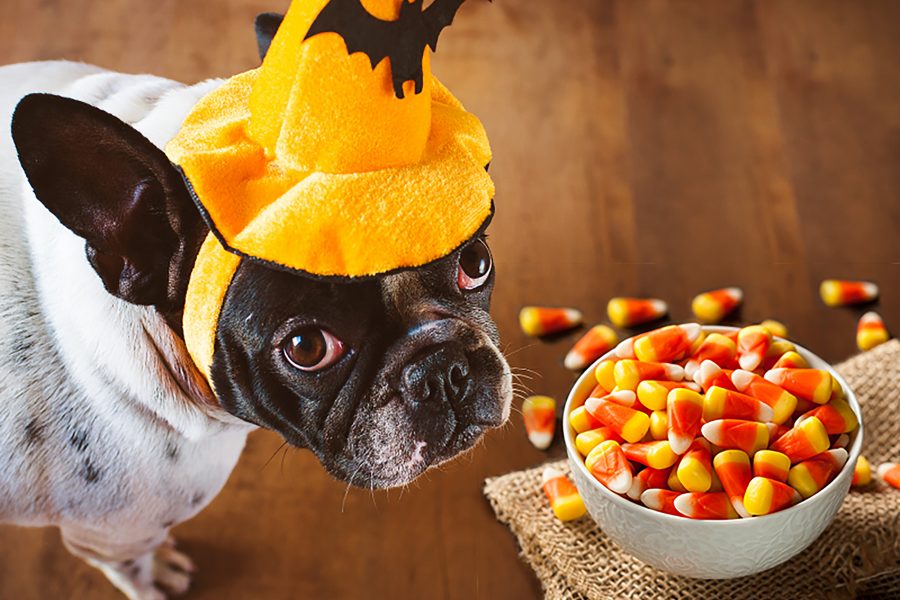
When it comes to avoiding foodstuffs, it doesn’t matter if yours is a puppy or an adult dog. Some foods are just not good for canine consumption and can be poisonous for them.
Human foods especially can be toxic for dogs. All dogs have different bodies and metabolisms which can be affected by toxic foods. Below are foods your puppy or dog should not be eating at all.
- Fruit seeds – Your dog may love eating fruits but make sure you do not feed them the seeds. Specifically, apple seeds should be avoided as they have cyanide in them. Not all seeds are harmful or fatal but feeding fruit seeds to puppies should be avoided.
- Avocado – Talking of fruits, feeding avocado to dogs and puppies is also not a good idea. It contains persin which can cause diarrhea or vomiting in dogs.
- Cat Food – Cat food is designed for cats and they contain all the proteins essential for cats and not dogs. Puppies should not eat cat food as they have very high meat content and proteins and fats.
- Chocolate – A puppy should not be fed any type of chocolate or anything that contains chocolate. Chocolate has theobromine which can speed up a dog’s heart rate and affect the nervous system. Dark chocolate, unsweetened chocolate, cocoa powder all are dangerous for puppies.
- Cooked Bones – Boiled eggs and chicken are okay for dogs but cooked bones can break easily and some of its pieces can lodge in different parts of a dog’s body and cause discomfort. Avoid feeding cooked bones to your puppy or dog.
- Garlic and Onions – Garlic and onions are both harmful for dogs. Garlic in limited amounts can still be okay but higher amounts of either of the foods should be avoided. They can kill or reduce a dog’s red blood cells.
- Grapes and Raisins – Dried fruits can cause kidney failure in dogs. Avoid feeding your puppy grapes or raisins. A tiniest portion also can make them sick and cause vomiting.
Frequently Asked Questions
When to feed a puppy?
You should feed your puppy 3 times a day at set times. First meal should be in the morning, the second at noontime and the last meal in the evening.
When to stop feeding puppy food?
When a puppy has matured and reached 11 months to 18 months of age you can stop feeding it puppy food. Puppy feeding of purely puppy food can be stopped after the puppy is 1+ years of age.
How many hours apart to feed a puppy?
You can follow a time interval of 4 to 5 hours after each meal. This time allows them to digest the previously eaten food. Their last meal of the day and first meal of the next day can have a 12 to 14 hours interval.
However, you should not starve them and can give them a little snack.
How to change puppy feeding schedule?
Your current puppy feeding schedule should be followed until the puppy is 14 to 18 weeks old. After this age you can give them 2 meals a day instead of 3. Make sure you increase the portion size gradually when changing to a new schedule.
How much puppy feeding is too much?
Feeding extra food to your puppy because they look cute while eating can lead to overeating in puppies. Do not give them more than 3 meals a day. As the puppy grows, puppy feeding should not be more than their own body weight.
When to change puppy feeding to twice a day?
By the time your puppy is 14 to 18 weeks old it will get used to the 3 meals a day feeding schedule. After this age their growth rate can speed up and this is the correct time to reduce their food to 2 meals a day. Extra food can cause them to grow faster than usual and this time is perfect to change puppy feeding to twice a day.
Hello Readers,
This was our ultimate puppy feeding guide to help you all understand the importance of puppy feeding. Hope you liked this article and it helped you know how, when and what your puppy should be eating.
Feel free to ask us your doubts and also let us know your reviews on this article.
Share this with your friends on WhatsApp or Facebook.
Subscribe to our YouTube channel for visual and quick information about dogs.
Happy Petting to You Guys!












[…] diet must be according to that. You can go through our link for more information on their diet Dog Feeding […]
[…] There are certain responsibilities of owning a dog and knowing what exactly is healthy to feed them is of utmost importance. You cannot be careless about feeding your dog because his health entirely depends on the watch he eats. The safer the food, the longer he lives. Provide him with a nourished and wholesome diet according to his weight and body needs especially during his growing age. For more information, you can take the help of our Ultimate Puppy Feeding Guide. […]